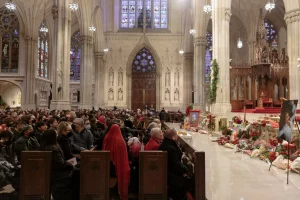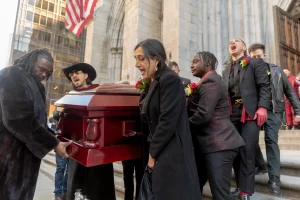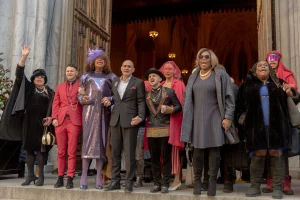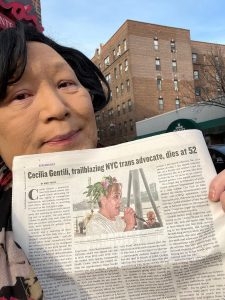Cecilia Gentili & her legacy of transgender activism & decriminalization advocacy work
by Pauline Park

Pauline Park & Cecilia Gentili in Brooklyn (11.15.19)
Cecilia Gentili’s death in February 2024 shortly after her 52nd birthday provoked a wave of grief across the lesbian, gay, bisexual, transgender and queer (LGBTQ) community in New York and beyond; the transgender activist who had blazed a trail for so many others drew hundreds of community members to Judson Memorial Church on Washington Square Park in Manhattan at a memorial service on Feb. 7; in fact, there were so many people gathered inside the church that hundreds were left standing in the hallway outside the sanctuary after the ground floor area and the balcony both filled to capacity.

Feb. 7 memorial service at Judson Memorial Church (photo by Donna Aceto for Gay City News)
“She cared about how we move people forward, how we make that arc towards justice. That is what she dedicated her life to, so that means we all have to continue that,” said Qween Jean, eulogizing Gentili at the service (Matt Tracy, “‘She always showed up’: Hundreds memorialize Cecilia Gentili in Manhattan,” Gay City News, 8 February 2024).
At Cecilia’s memorial service at Judson Memorial Church, Sean Coleman (executive director of the non-profit Destination Tomorrow, spoke of Cecilia’s creating change even when people didn’t notice it. He praised Gentili’s role in facilitating the Trans Equity Fund, which has steered millions of tax dollars to organizations serving transgender individuals across the state, and he remembered her as a leader who built bridges between communities.
“My fear is that bridge is gone,” he said. “How do we stay united now? I’m going to ask you to carry on her legacy, and her legacy was to make sure all of us be free together.”

Feb. 7 memorial service at Judson Memorial Church (photo by Donna Aceto for Gay City News)
Even in death, Cecilia made history, becoming the first transgender activist to have a funeral service in St. Patrick’s Cathedral (the entire funeral service is on YouTube), with Gay City News editor Matt Tracy writing, “Thousands of attendees and hundreds of online viewers mourned the late Cecilia Gentili on Feb. 15 at St. Patrick’s Cathedral” (Matt Tracy, “Friends and family bid farewell to Cecilia Gentili at St. Patrick’s Cathedral,” Gay City News, 15 February, 2024).
“She was an angel,” Tracy quoted Peter Scotto saying of his partner at the service in the cathedral. “Seeing all the people at the funeral services, and all the love I’ve received from people in her community all over the world, is a testament of how awesome Cecilia was. I’m so grateful for them all. She was an angel, an icon, a mother, an educator, a leader, and so much to so many people. Her children from AIPACHA — I’d hear all the stories of trans kids getting hormones for the first time. Our phone would ring all the time in the middle of the night and she’d jump into action to help people in crisis. She’d always be there and answer that call. But to me, she was my partner. We woke every day next to each other with so much laughter and love. I’m going to take that with me forever.”

The Feb. 15 service in St. Patrick’s Cathedral (Susan Blasener for the New York Times, 15 February 2024)
“Gentili, who moved to the United States from Argentina, was active as an activist and in other capacities, including positions at Apicha Community Health Center, the LGBT Community Center, and GMHC,” Tracy wrote in Gay City News, adding, “She also played a leading role in advancing policy initiatives such as the Gender Expression Non-Discrimination Act (GENDA) and the campaign to decriminalize sex work in New York State. She founded Trans Equity Consulting and spearheaded the opening of a new healthcare clinic for sex workers called COIN, or Cecilia’s Occupational Inclusion Network. Among other achievements, she was involved in the entertainment industry, on shows like ‘Pose’.”
Noted Tracy, “St. Patrick’s Cathedral is the same church where activists with ACT UP and Women’s Health Action and Mobilization disrupted a service in 1988 in the “Stop the Church” demonstration to protest the Catholic Church’s policies toward LGBTQ people, abortion, and HIV/ AIDS. Some of those same activists returned to the same space in 2019 to mark the 30th anniversary of that demonstration.”

The Feb. 15 service in St. Patrick’s Cathedral (Susan Blasener for the New York Times, 15 February 2024)
There is a certain irony in a confirmed atheist and an inveterate rabble rouser having her final send-off in the seat of the Roman Catholic Archbishop of New York, but Cecilia certainly deserved that level of recognition; and I suspect she would have been tickled pink to know that the New York Times reported on the event (Liam Stack, “Mourning a Transgender Activist at a Cathedral That Once Drew Protests,” New York Times, 15 February 2024).
In his report for the Times, Liam Stack noted the irony, writing,
“The pews of St. Patrick’s Cathedral were packed on Thursday for an event with no likely precedent in Catholic history: the funeral of Cecilia Gentili, a transgender activist and actress, former sex worker and self-professed atheist whose memorial functioned as both a celebration of her life and an exuberant piece of political theater.
Over 1,000 mourners, several hundred of whom were transgender, arrived in daring outfits — glittery miniskirts and halter tops, fishnet stockings, sumptuous fur stoles and at least one boa sewed from what appeared to be $100 bills. Mass cards and a picture near the altar showed a haloed Ms. Gentili surrounded by the Spanish words for “transvestite,” “whore,” “blessed” and “mother” above the text of Psalm 25.
That St. Patrick’s Cathedral would host the funeral for a high-profile transgender activist, who was well known for her advocacy on behalf of sex workers, transgender people and people living with H.I.V., might come as a surprise to some.
Not much more than a generation ago, at the heights of the AIDS crisis, the cathedral was a flashpoint in conflicts between gay activists and the Catholic Church, whose opposition to homosexuality and condom use enraged the community. The towering neo-Gothic building became the site of headline-grabbing protests in which activists chained themselves to the pews and lay down in the aisles…”

The Feb. 15 service in St. Patrick’s Cathedral (Susan Blasener for the New York Times, 15 February 2024)
The Times reporter quotes the lead organizer of the funeral Ceyenne Doroshow as saying that Cecilia had wanted the service in the cathederal because “It is an icon, just like her,” though Doroshow is also quoted as saying that she did not inform the cathedral staff in advance of Cecilia’s gender identity, saying, “I kind of kept it under wraps.” But as Stack noted in his report for the Times, “Pope Francis has taken steps toward inclusivity, saying last year that transgender people can be baptized, serve as godparents and be witnesses at church weddings.”
“The service on Thursday was an event that most likely had no precedent in Catholic history,” wrote Liam Stack two days later, noting that “The Rev. Enrique Salvo, the pastor of St. Patrick’s, said the church was not aware of Ms. Gentili’s background or beliefs when it agreed to host the service and quoting him as saying, “The cathedral only knew that family and friends were requesting a funeral Mass for a Catholic, and had no idea our welcome and prayer would be degraded in such a sacrilegious and deceptive way” (Liam Stack, “N.Y. Archdiocese Condemns Funeral of Transgender Activist at Cathedral,” 17 February 2024). The right-wing group CatholicVote called the service “unbelievable and sick” and “a mockery of the Christian faith” (ibid.) while the Rev. Nicholas Gregoris — a co-founder of the Priestly Society of Saint John Henry Cardinal Newman — called the service “revolting” and a “blasphemous and sacrilegious fiasco” as well as “a deplorable desecration of America’s most famous Catholic Church.”
Cecilia’s family responded to what they called the “hypocrisy and anti-trans hatred” of the condemnation of the event by declaring, “Her heart and hands reached those the sanctimonious church continues to belittle, oppress and chastise. The only deception present at St. Patrick’s Cathedral is that it claims to be a welcoming place for all” (ibid.). The Times’ Stack suggested in his follow-up report that the archdiocese had been informed by a reporter that Cecilia was a transgender activist, though the cathedral apparently held a special ‘Mass of Reparation’ to atone for the funeral service on Saturday (two days after Cecilia’s funeral service). I’m guessing that Cecilia herself would be chuckling to hear that her funeral service provoked such an uproar among homophobic and transphobic right-wing Catholics; the fact that Cecilia could provoke such a ruckus even in death is to my mind testimony to the power of her advocacy as well as her personality.
In her obituary for the New York Times, Penelope Green wrote, “Cecilia Gentili, a fierce advocate for transgender people and sex workers and a powerful legislative lobbyist — as well as an author and a bawdy, searing performer — died on Feb. 6 at her home in the Marine Park section of Brooklyn. She was 52. Her death was announced by Peter Scotto, her longtime partner” (Penelope Green, “Cecilia Gentili, Transgender Activist, Performer and Author, Dies at 52,” New York Times, 12 February 2024).
“Ms. Gentili often joked that she had a master’s degree in being an immigrant, a sex worker, a trans woman and an addict. She was an expert because she had lived all of those things. She was born in Argentina and had been sexually abused since she was a child. As a trans woman in Argentina, she said, the only work she had been able to find was prostitution. She left South America for the United States in 2000, seeking safety and a better life. That did not happen. At least not at first. Undocumented, homeless and trafficked for prostitution in the U.S., she also had a heroin addiction. After multiple arrests, she found herself in the men’s ward at Rikers Island, where, she said, she was raped and beaten…”

The Feb. 15 service in St. Patrick’s Cathedral (Susan Blasener for the New York Times, 15 February 2024)
Penelope Green then recounts Cecilia’s transition from a sex worker and an addict to a social service provider, transgender activist and policy advocate, noting her rise to managing director of policy at GMHC (founded as Gay Men’s Health Crisis). Green also notes Cecilia’s role as one of two plaintiffs who successfully sued the administration of Donald Trump after he attempted to roll back transgender-inclusive protections in the Affordable Care Act (‘ACA’ or ‘Obamacare’) and Cecilia’s founding of DecrimNY to decriminalize sex work under New York state law — legislation currently pending in the state legislature.
“But Ms. Gentili was more than just a skilled lobbyist, self-taught policy wonk and mentor to trans people. She was a gifted storyteller whose accounts of her harrowing experiences were helpful as she went through the asylum process and which she later turned into tragicomic gold,” wrote Green in her Times obituary.
Green also noted Cecilia’s birth on 31 January 1972 to a butcher and a house cleaner in the town of Gálvez in northeastern Argentina; her indigenous grandmother let her wear her jewelry and clothes and told off the minister in their local Baptist church after he objected to her ‘abu’ allowing her to express her gender identity; bullied in school and molested by a neighbor, Cecilia left home at 18.

In Cecilia’s honor, Cecilia’s Legacy Fund has been established to ensure that the work she began continues; as those who established the fund wrote on her Facebook page, “Cecilia Gentili leaves a blazing legacy of love, kinship, and an infinite fire to uplift the liberation of trans people, sex workers, immigrants, and those pushed to the margins. The driving force of her life was an extraordinary generosity that extended to all the community she touched as an advocate, a mother, an artist, an advisor, a leader and a friend…”
On February 15, I attended “Watermelon Pink: The Crossroads of Queerness & Arabness Through the Lens of Palestine” and was surprised that Cecilia’s name came up; at this public forum sponsored by the Bureau of General Services — Queer Division at the LGBT Community Center in Manhattan, one of the speakers mentioned Cecilia’s support for Palestine and it struck me that none of the media accounts of her life and death — either in the LGBT press or the mainstream media — mentioned Cecilia’s support for Palestine and queer Palestinians; it struck me as a revealing omission.
The sole reference in media reports on Cecilia’s life and death that I could find was in “Vogue,” ironically enough, in which Grace Byrone wrote, “For many of us, meeting Cecilia was just like that: coming home. She built a house big enough for everyone, offering a vision of the future where trans women are empowered to help one another, build coalitions, and fight back against racism and discrimination. Just last fall, she was arrested in Grand Central Station alongside Indya Moore during a pro-Palestine protest” (Grace Byron, “The Matriarchal Legacy of Cecilia Gentili,” Vogue, 17 February 2024).
In thinking back on all of my interactions of Cecilia, I have my own memories of her — all of them fond and warm — and I am proud to have been able to call her a friend; one particular sticks in my mind; she and I both attended a community event in 2019; it was a dinner for transgender community members at which each of us shared a story or a thought; Cecilia was a warm presence on that cold night in November and I was happy to be able to catch up with her, hearing her news and sharing mine. I was profoundly shocked and saddened to hear of Cecilia’s death and felt it personally as well as understanding it as an enormous loss to the community — the many communities whose presence she enriched and whose members she helped empower — including the transgender, LatinX, sex worker and health care and social service provider communities.

Cecilia had so much in common but she was not (as far as I know) ‘into’ opera as I am, but since her death, I cannot help but think of another great Cecilia — Cecilia Bartoli — and the mezzo soprano’s rendition of “Ombra mai fù” — the aria from Georg Friedrich Händel’s opera “Serse” — strikes me as fitting a musical tribute to my friend and fellow activist as any I can think of: the Italian opera singer’s performance in this music video has all the beauty and grace and presence that Cecilia Gentili had and the text in Italian describes the beauty of her soul so well:
Ombra mai fù
Di vegetabile,
Cara ed amabile,
Soave più.
Di vegetabile,
Cara ed amabile,
Soave più.
Never was a shade
of any plant
dearer and more lovely,
or more sweet.

In the opera, the Persian emperor Xerxes (Serse) describes a plane tree and one may call it the greatest love song to a plane tree ever written. Like that plane tree, Cecilia Gentili was tall and graceful and gave shade to so many, taking so many under her capacious branches.
Good night, sweet princess, and flights of angels wing thee to thy rest…

Cecilia Gentili & Pauline Park in Manhattan (5.30.12)
Pauline Park is chair of the New York Association for Gender Rights Advocacy (NYAGRA) and coordinator of the transgender support group at Queens Pride House as well as a member of the Out-FM collective that broadcasts LGBT-related programming on WBAI-FM.